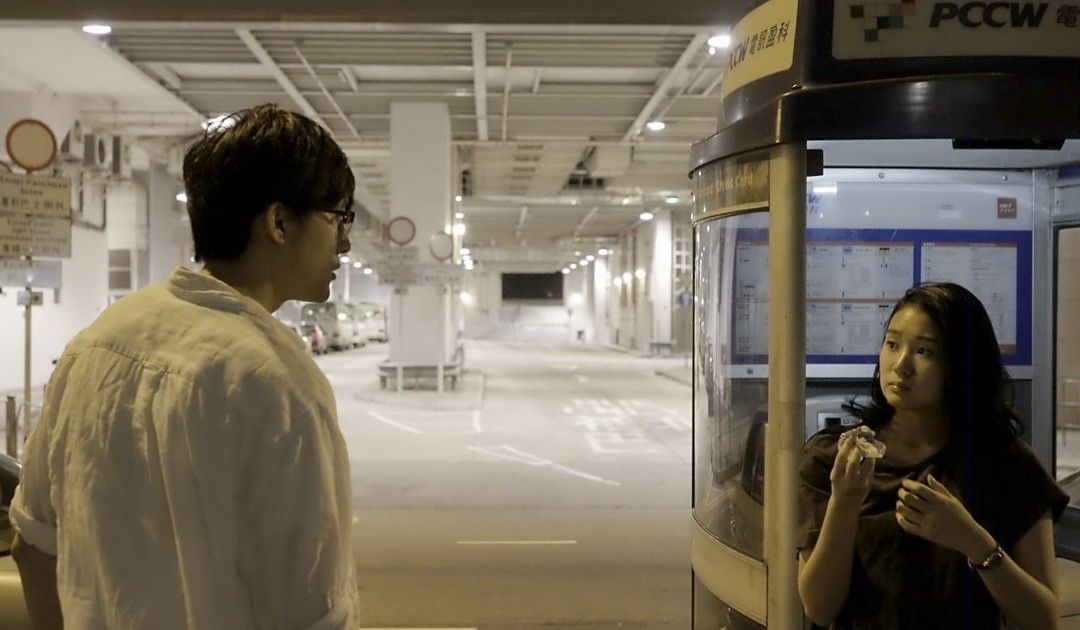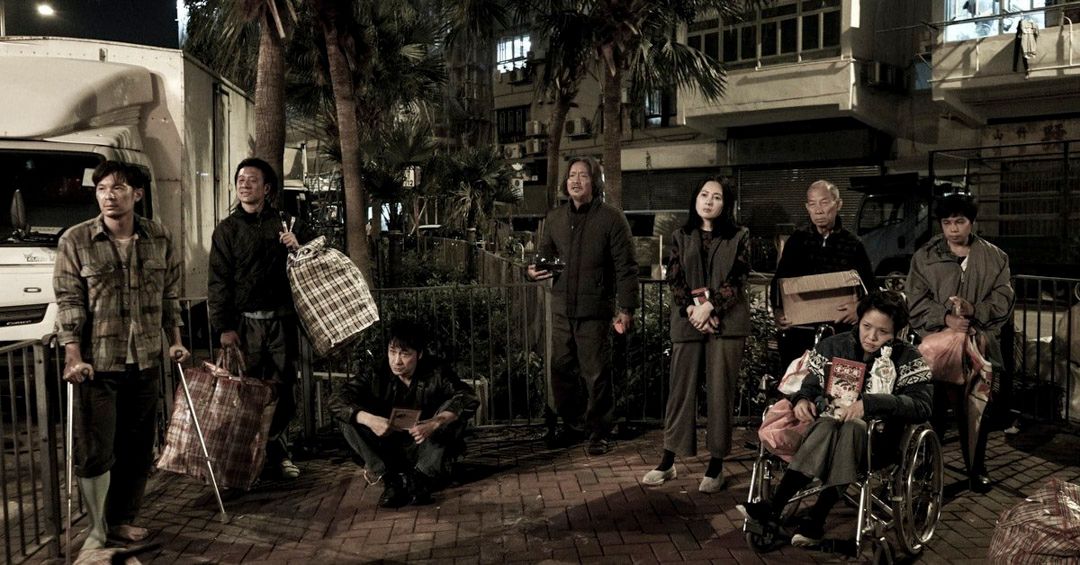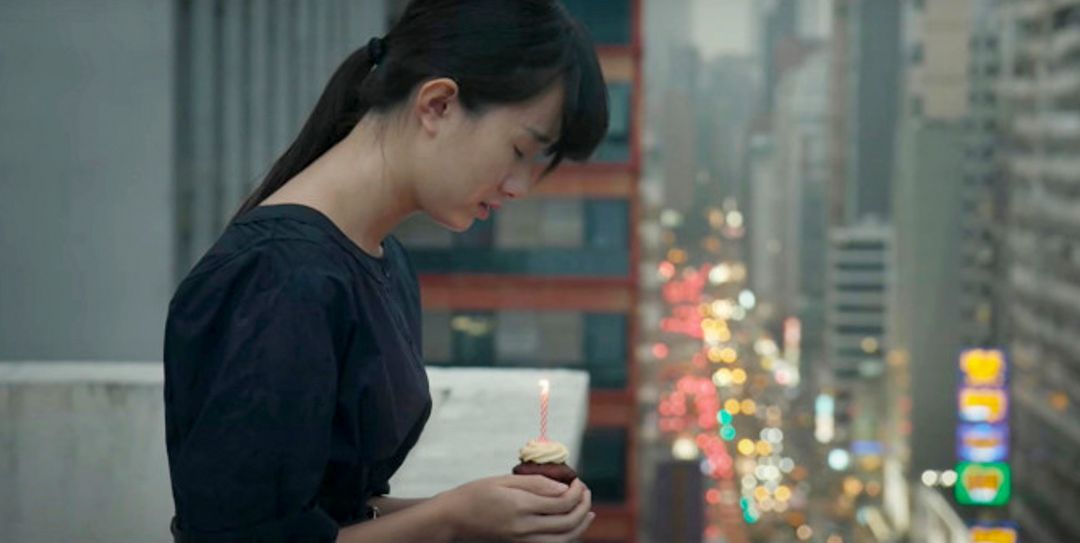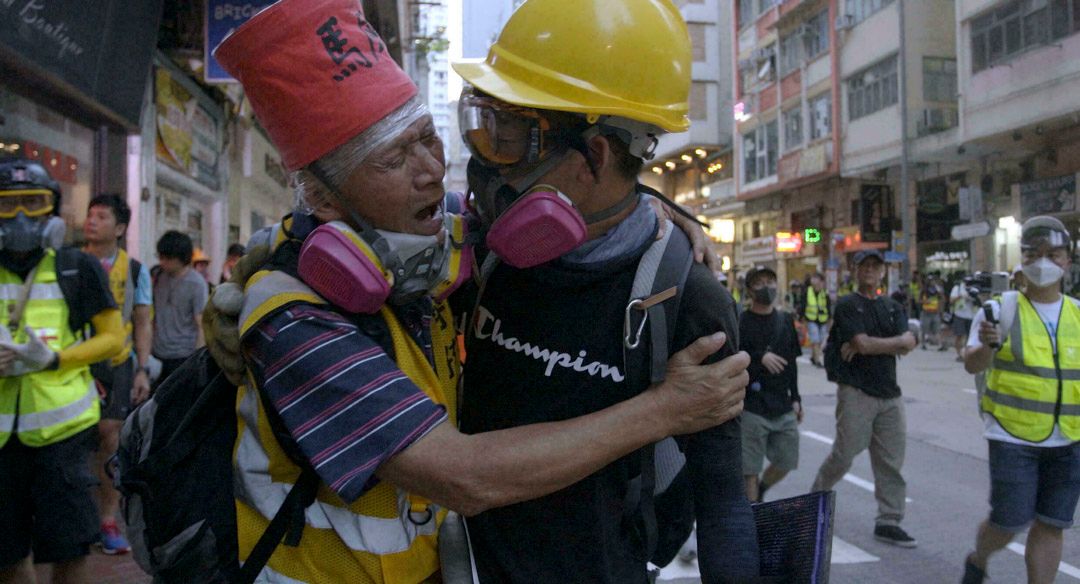
清大社會所碩士。自由文字工作者。
Ghosts in My City: On "Flowers and Fruits" and Hong Kong Films at the Golden Horse Awards
The original text was published in Duan Media on 2021-11-26

"We let you come into the world, and we didn't build an ideal living environment for you. It's really ashamed. But we can't do it, because our ability is limited, or we're lazy, there's nothing we can do except sorry. We're ashamed, But you don't have to be discouraged; since you are here, you have seen it, you know it, and you are young, you can create a beautiful new world according to your ideals." - Sixi "My City"
Luo Zhuoyao's "Flowers and Fruits" (2021) had its international premiere at this Golden Horse Film Festival. The film festival also selected the director's "Floating Life" produced in 1996 to re-screen. These two films are the most surprising echo combination. "Floating Life" was nominated for Best Director at the 33rd Golden Horse Awards; "Flowers and Fruits" was "only shortlisted" for the Best Director category this year. In fact, "Flowers and Fruits" should also be shortlisted for the best feature film of this year's Golden Horse Awards for its extensive creativity, subject-matter span and courage to interweave form and content. It is especially risky (or even unpleasant) in terms of political themes, and its frankness in production is naked, but its care is conveyed with sincerity, and it is more worthy of recognition by art awards.
This year's Golden Horse Awards feature films about the Hong Kong protests include "Youth", feature length documentaries "Revolution of the Times", "Daily Life" and the short film "The Good Night Can't Stay". Destroyed my damaged city. At this time, Luo Zhuoyao still chose to give a high degree of sympathy and gaze to those who cherished the dream of Chinese democracy in the early days. Frankly speaking, even as a Taiwanese audience, it is hard to avoid breaking into a cold sweat when you hear "Mandarin" singing in Hong Kong street scenes. I wonder if young people in Hong Kong can accept such a perspective? But "Flowers and Fruits" does not hide its concern, and the rough and candid lens performance shows the original intention of the creation. Isn't the Golden Horse Award the most suitable place for such a theme? Perhaps only the Chinese audience can understand the difference in accents, understand the drift of generations, and understand the taste of the slap.
In this year's shortlist for the best feature film, let alone Taiwanese films, another Hong Kong film named Drifting is also the most popular film in total. , the filming and production are delicate, and there are many vivid and profound details, but the tone of too eager to fill in the elements of various issues of the feature film is less surprising in the creative form. I think in terms of feature films, "Flowers and Fruits" may be a higher level. But in general, the image that Hong Kong films pieced together in this Golden Horse Film Festival is still a rich, exciting and complete collective appearance.

From time to time we "project" a lot of reality in our movies. The protagonist of "Drifting on Turbid Water" made a heart-warming speech that "the government should apologize if it did something wrong." Projections parallel to the dimensions of different social issues. "Floating Life" is another projection perpendicular to the dimension of time and space: the old father who immigrated to Australia suffered from the war, and casually recited "not like immigration, like exile." : "For decades, I have been used to being homeless and without a country. Now I have finally landed on the shore, come to Australia, heaven on earth, family reunion, and can take root. Why, why can't you breathe a sigh of relief?" Prophecy projection Twenty years later now.
Therefore, the juxtaposition of "Floating Life" is also of great significance to the new work "Flowers and Fruits": the former is a movie released on immigration issues before the return of the 1997, with relatively delicate scenes, vivid performances and neat scheduling; The latter put aside many superfluous attachments in creation, and used simple metaphors and plot twists to show the impermanence of collective changes, the confusion of individual growth, and the impermanence of life and death.
To a certain extent, "Flowers and Fruits" may be the most "courageous" work of this year's Golden Horse Film Festival. In addition to the juxtaposition of historical events and characters with their own political sensitivity, it is a kind of courage in the issue; in the creation of the film, it also shows its perseverance with an extensive momentum. Shaking and out-of-focus camera lenses, spontaneity editing, bold sound effects, and the slightly clumsy use of names, photos, and song names, such as documentary reshoots, deliberately shaped the scene, and even the text description was released directly. Compared with "Floating Life", I know that this is a deliberate production. Although there is a generational gap in ideology and care that young people can't share, it is also somewhat admired.
Briefly explain the theme of "Flowers and Fruits Falling": it released live videos of the Hong Kong Umbrella Movement, filmed young characters participating in the protests, filmed Macau with the June 7 riots, filmed the June 4th with candlelight metaphor, and filmed the fighters who devoted themselves to China's democratization ( I'm also afraid that young people will attach ancient photos and dates as if they don't understand history), but also take pictures of ancient geological traces of the Great Wall, and even bring out the Russian Revolution in distant places with classical music. Looking at the above, if it is framed as "Chinese Democracy" or "The Ghost of a Revolutionary Fighter", how stuffy and boring would it be?
But in the story, through the "I" (voice of the director) behind the camera and the young pianist in front of the camera, uttering his voice lightly, moving as if far and near, the ghost and the street scene are "reorganized" into a complete and independent story. Express "I" anxiety, deterrence and embarrassment. The camera shakes, but the imagery is very clear and corresponding: teenagers across time and space all want to create a beautiful new world according to their ideals, but they are bullied by the regime and lose their lives. The ghosts of these young people are drifting all over the streets of my city, as if they will meet each other in the blink of an eye.

The young pianist who runs through the plot reflects the two sides of the oneness of man and ghost. This living body that moves between "human and ghost", as the visual medium of the whole film, brings "me" to the city and to the street . "I" saw the "brother" in my memory, the most bloody June 7 riot participant in the history of Hong Kong and Macau protests; but memory and vision are intertwined, so I can only keep on searching and failing. I'm mistaken for "Brother", but in fact, the "Badasda" who have been on the streets for generations are all siblings. If they wear helmets and blindfolds on the streets, they all look familiar.
Then, the pianist met what seemed to be a ghost, a "mentally ill", a "normal person", and just an ordinary Hong Konger, and saw a candle that looked like June 4th. In fact, who is human, who is ghost, who is mentally ill, and who is normal and ordinary person? Because of this interlacing, in fact, the classification of Hong Kong people, Macau people, Taiwanese and Chinese people is completely irrelevant in this work.
Back in 1996, the characters under "Floating Life", from Hong Kong to Australia, Germany and other parts of the world, still pay attention to the cultural habits of Asia, Chinese and tropical regions from time to time, and match the sound effects of Chinese musical instruments. "Flowers and Fruits" plays the most famous piano music in Russia and Europe in a rough and noisy way, almost overpowering the characters and dialogues in the scene, listening in the theater, and even roaring to the point of discomfort , seems to be a provocation and mockery of classical aesthetics; there are also characters in the film who have an old-fashioned line of advocating classical music, laughing at what others don't know, and insisting in embarrassment. This direct and ingenious design makes the whole film relatively messy, sloppy, and "unbeautiful" - it seems to be realistic but not realistic, magical and not magical, and it is easy to let the viewers watch when people and ghosts switch and the times drift. The author is "unacceptable" - but it is a precious example of an alternative model for depicting Hong Kong in contemporary times.
As far as the Hong Kong films of this Golden Horse Film Festival are concerned (although I have not watched all the Hong Kong films in the true sense), if I use the deliberately and finely ground-level depictions and city images in "Drifting on Turbid Water" to understand the powerlessness of Hong Kong society In "Revolution of the Times", he used the time sequence chapter of the anti-extradition movement to review the images of the front-line brothers and sisters (including the recorders) on the big screen; briefly in "Good Night Can't Stay", he stared at the "November" of the turning point of the protest of that year. Abnormal" Hong Kong; then in "Daily" from the small scene frame to the big screen, I see people's bumps and performances behind it, to refer to the depth of land and humanities - then, finally, I will use "Youth" This drama, which strives to capture the emotion of struggle, the mixture of reality and fiction, is to write a commentary on "Flowers and Fruits".

"Youth" tells the story of a group of Hong Kong people, whether they are He Lifei, Yong Wu, sentinels, drivers, social workers, etc., in addition to performing their duties in street guerrilla warfare, they also need to rescue people with suicidal thoughts within limited clues. siblings. When the girl "YY" who tried to commit suicide in the film was released from the police station, she heard the girl on the side of the road crying, "They (should refer to the Hong Kong police) are messing with me. Where are you?", "YY" especially approached the stranger who had never met before. Beside the girl, he said, "Don't let them go if you are a ghost." As soon as these words came out, the girl who had collapsed and collapsed suddenly calmed down.
The ghost is here first and then there. The ghosts are not spared, and the ghosts are still waiting for recovery. At this time, the will has penetrated different movies: the fighting girl in "Flowers and Fruits" shows the pianist with the mobile phone photo, saying that he is looking for him. dead boyfriend. She said even the ghost had to find him. Next, the girl rushed to the tracks of the MTR and to the edge of the overpass. Such repeated self-destructing drama seems to have become an inevitable suicidal ideation that "doesn't need to be explained" today.
Therefore, when the young pianist who had never met her, he just grabbed her directly and grabbed her from the edge without any explanation. Later, even if the girl's father appeared to be threatened, the pianist just held the photo of the mobile phone and signaled to find the daughter. He impatiently pieced together the information. Although the process was quite difficult, he had no hesitation and wanted to connect with each other. And isn't this the group of rescuers we saw in "Youth"? Looking for and saving people with the screen of the mobile phone, even if you have never met, you have to give your best. Isn't this all the people who were inspired by the struggle? In "Flowers and Fruits", the "support" without hesitation, the risk-taking, helpless listening, and the catharsis of the piano keys have long become an obligation of "no need to explain" to us audiences in front of the screen. Because this is Hong Kong today.
Films in Hong Kong today are constantly flowing and piecing together in theaters, becoming a strong collective memory. In "Flowers and Fruits", there are "juveniles" who were born under totalitarianism and oppression, and in various eras. They talk about life and death. For example, in the interview of Times Revolution, a group of people who assisted students to escape from the sewers during the siege of PolyU said, "The most distressing thing is that we don't know if we can really guarantee his safety after reporting this route. Escaped. Some siblings lost communication, but GPS positioning is still in the waterway. If this person is washed away in the waterway, no one will remember him and what he went through...Why do young people in Hong Kong suffer like this? "This kind of accusation runs through all the movies. Changed an event, a song, a city, the fate of hardship and separation remains the same. It is in the mutual echo, complement and arrangement of all works that the audience can gradually piece together the appearance of this community.

Perhaps, such a fate is not only Hong Kong, but a state that transcends borders and continues to cycle in history, but creators can only record and preserve their emotions from their own feet and identity. Just as "Daily" selected many pictures of performers and their performances in the documentary, and made up the plot of the dialogue between the protesters and Chen Tongjia. In fact, in the eyes of future audiences, the boundaries between reality and performance, dramas and documentaries, pictures captured by the struggle, or pictures produced by the crew, will only become more and more secondary. The most important thing is the current emotions. The difference between the living people and the ghosts on the screen is not too big. They are all actors, and various classification methods are no longer so important.
For me, "Flowers and Fruits" is a work that is a little alienated at the level of collective memory. Such distance is indeed reflected in the reflection of "people/ghosts" under the operation of the camera. It does not hide its relationship with young people at all. , local identities, alienation from young audiences.
In the second half of the movie, there is a scene in which an out-of-place Chinese ghost appears in our city, and he has a long speech with a Hong Kong protest girl, expressing the will of the revolution. Logically, I should feel unhappy about this, like the preaching of my elders (albeit ghosts). However, because he was wearing ancient costumes and ancient leather bags, there was no scene of sensational music and memories, he and the girl just walked slowly in the modern high-rise buildings, artificial pools, and buses full of commercial advertisement pictures and texts in the city. stop sign. The stop sign does not have any special symbols, and the buildings and pools are just like everyday street scenes, like a documentary "shooting the present". The simple appearance and respect for the present appearance made me feel the honesty of the creation. Also more forgiving.
Therefore, the self-awareness of "Flowers and Fruits" is very clear. Even if the film is interspersed with parts that explain and enumerate historical knowledge like a textbook, the end of the film can't help but write conclusions and annotations like a traditional composition, and I will not accuse him. "Dog", let alone a sense of alienation arising from differences in collective memory, will not abandon this work. After watching several Hong Kong films at this year's Golden Horse Film Festival, I think that this film, which makes people a little "acclimatized", deserves more affirmation, attention and interpretation.
I think, whether it is the creator, the audience or anyone who cares, during this period of time, they may feel hardship, shame and frustration, but they can also understand, understand, interpret, and even go further. To create and produce various possible carriers, to enrich "Drifting" and any symbolic meaning that arises as the times require. For example, the meaning of the slogans "Be Water", "Lanchao" and "Recovery Era" shouted by the protesting brothers and sisters are also in the chaotic ups and downs of the streets, and they are more complete and "Hongkongers". We simply stand in line without being divided by traditional identification, nor follow the instructions of the elders and follow up blindly. In art, we still have space to accommodate each other and look directly at each other's pain. "Flowers and Fruits" allowed me to see this recognition and recognition, and vaguely heard the ghostly echo: Since we are here, we have seen it, we have known it, and we are young, we can create beautiful new things according to our ideals. world.
Original URL: https://theinitium.com/article/20211126-culture-goldenhorse-driftingpetals-driftinghongkong/
Like my work?
Don't forget to support or like, so I know you are with me..
Comment…